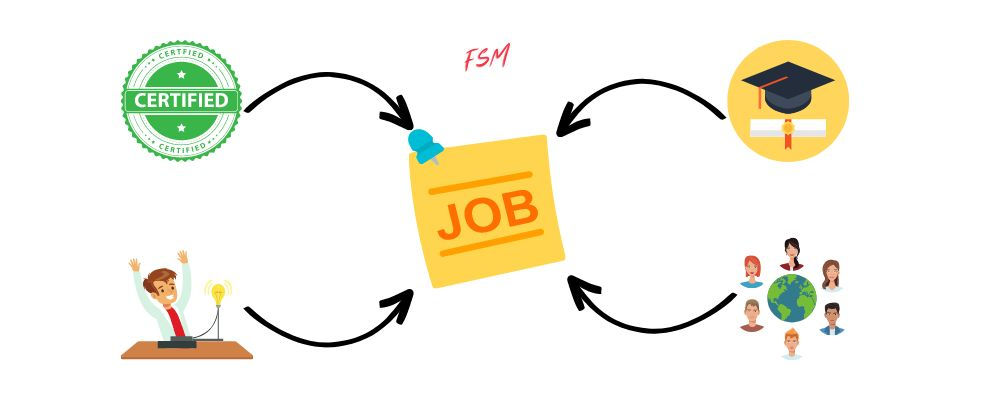With a continuing increase in demand for cybersecurity, there has been a similar rise for professionals in Information Security (IS), especially for those with skills in ethical hacking.
Ethical hackers are professionals who use their skills and knowledge to test the integrity of computing and network infrastructure. They aim to find vulnerabilities in the systems with the goal of addressing the vulnerabilities and providing suggestions on improving security measures.
See Also
In this post, I will be going over the details of finding a job as a hacker and also discuss certifications you can acquire to gain ethical hacking skills.
Let’s get into the post.
Careers in Ethical Hacking
Careers in hacking usually come under the umbrella of Information Security. In the IS field, there are many diverse roles available offering a range of opportunities for individuals with a passion for technology and security.
Listed below are some of the Here are some of the most popular careers in the field of hacking:
- Cloud Security Engineers & Analyst: Experience in architecture and design of enterprise cloud solutions and IT audit, security risk assessment, and regulatory compliance fields. Maintain and update, and track the System Security Plan (SSP) for assigned Information System (IS) and Platform Information Technology (PIT) Systems. Plan and develop budgetary estimates for security control implementation, assessment, and sustainment throughout the system life cycle, including timely and effective configuration and vulnerability management.
- (Cyber)Security Test Engineers: Develop test plans and test procedures for evaluating the security of software systems. Develop security test cases and scripts to be used in manual/automated testing environments. Evaluate software systems for compliance with industry and government security standards and best practices. Stay current with the latest cybersecurity threats and technologies and make recommendations for improvements.
- Ethical hackers: Usually you won’t find a specific title as an ethical hacker. But this role is usually mixed in with jobs for developers and testers working in the information security domain.
- Forensics Analyst: Forensics analysts use their skills to collect and analyze digital evidence in support of investigations into cybercrime and other security incidents. Jobs for forensic analysts are available in both public and private organizations, such law enforcement agencies, government agencies, and security companies.
- Information Security Manager: Information security managers are responsible for developing and implementing security policies and procedures to protect organizations against cyber threats. They usually manage a team of security experts within a larger Information Technology (IT) department.
- Penetration Tester: Conducts penetration testing, vulnerability scans, and other security testing activities to identify security risks and vulnerabilities of test systems.
- Security Researcher: They are responsible for finding and reporting security vulnerabilities in software and hardware products. The key focus is to monitor the evolution and threats of new and emerging technologies.
The information security field in vast as it offers a variety of career options for those looking for a career in ethical hacking.
There are opportunities in defining policy, developing and testing applications and securing of systems and networks.
All jobs though are not in soft fields. There are options available in the physical security domain as well, such as for those looking for a role in securing the actual physical hardware and data centers.

How Can I Find a Job As A Hacker
Finding a job as a hacker is a competitive process. But since this is a growing field, the rate at which the jobs are growing is faster than the number of people actually available, especially when considering the geographic locations.
How there are several steps you can take to increase your chances of success in standing out from the pack and securing a job that you desire. I have listed below some options you can follow.
Build Your Skills
Focus on building your technical skills in areas such as programming, cryptography, network security, and ethical hacking. Check out my post on Best Information and CyberSecurity Degree Programs for in-person and online degree programs.
Gain Practical Experience
If you are already working, try to find out if there is an opportunity that allows to gain on the job security experience.
Additionally, you can:
- Contribute to open source security projects
- Get internships to gain practical experience in the field
- Participate in online hacking competitions
- Volunteer for security related projects
By utilizing one and more of these activities you can build a portfolio of work that will increase your chances of success.
Network with Other professionals in the Field
Attend cybersecurity conferences: Learn about new trends and technologies.
Join online forums: Find out what important issues are being discussed and what potential solutions are offered.
The above two methods will provide an opportunity for you to connect with professionals who may help open doors to opportunities that you seek.
Looking into Getting Security Related Certifications
Certifications such as Certified Ethical Hacker (CEH), Certified Information Systems Security Professional (CISSP), and Certified Penetration Tester (CPT), help you stand out to potential employers and demonstrate your expertise in the field. My post on Top 10 Certifications for Ethical Hackers To Boost Your Career, discusses in details various certifications available to enhance your skills.
Consider Freelancing Opportunities
As you build skills in security technologies, you may want to look into getting some hands-on opportunities as a freelance hacker. This will help you get your foot in the door.
Applying For Jobs
Apply for jobs in the field of hacking, including positions at cybersecurity firms, consulting firms, and government agencies.
Be sure to tailor your resume and cover letter to the specific job you are applying for and highlight your relevant skills and experience.
Job boards are a great place to look for open positions, and sometimes I prefer them over applying directly through a company website.
Search for jobs now
You can start searching for a new job immediately through one of the job sites below.
In Summary following are some way to utilize when seeking a new career opportunity.
- Job Boards and Career Websites: Indeed, Glassdoor, and LinkedIn Jobs are great places to start.
- Cybersecurity Conferences and Events: These offer an opportunity to meet face-to-face with recruiters and attend workshops.
- Professional Organizations and Networks: They offer opportunities to network with professionals in the field and provide access to job listings and internship offers.
- Cold Outreach: Not for the introvert but cold outreach to companies that match your interest is a good way to make connections and find opportunities.
- Freelance Work: Look for freelance opportunities on websites such as Upwork and Freelancer.
Job Titles and Salary Range for Various Hacking Jobs
There are a variety of job titles for individuals who work in the field of hacking.
In the table below I have listed some actual titles companies are advertising. I have extracted the description from multiple job listings to give you an idea of the skills and knowledge desired by the companies.
The pay range is an estimate provided by GlassDoor, based on the jobs posted on their job networks.
| Title | Description (extracted from actual job descriptions) | Pay Range | |
|---|---|---|---|
| 1 | Cloud Security Engineer | Experience in architecture and design of enterprise cloud solutions and IT audit, security risk assessment, and regulatory compliance fields. | $102,000 to $232,000 per year. |
| 2 | (Cyber)Security Analysts | Develop, maintain and update, and track the System Security Plans (SSP). Plan and develop budgetary estimates for security control implementation, assessment, and sustainment throughout the system life cycle, including timely and effective configuration and vulnerability management. | $75,000-$180,000 per year. |
| 3 | (Cyber)Security Test Engineer | Develop test plans and test procedures for evaluating the security of software systems. Develop security test cases and scripts to be used in manual/automated testing environments. Evaluate software systems for compliance with industry and government security standards and best practices. Stay current with the latest cybersecurity threats and technologies and make recommendations for improvements. | $90,000 to $210,000 per year. |
| 4 | Security Consultant | Consultants will have the technical and business process knowledge necessary to guide clients through the analysis, design, implementation, and integration of one or more products. | $73,000 to $142,000 per year. |
| 5 | Forensics Analyst | Proven expertise in filesystem analysis in one or more OS: Mac, Windows, Linux/Unix Experience with industry-standard Digital Forensics methodologies, including evidence handling, chain of custody procedures, and commonly used forensics toolsets | $73,000 to $115,000 per year. |
| 6 | Information Security Analyst | Perform triage & fact identification. Investigate and respond to internal and cybersecurity threats. Contribute to processes, capabilities and overall security operations. Identify and recommend improvements in detection, response, communication and remediation processes. | $79,000 to $182,000 per year. |
| 7 | Information Security Engineer | Experience in system administration tasks and managing and configuration of large systems and networks. Require experience with compliance and utilization of security technical implementation guides (STIGs). Additional hands-on experience with tools, such as Nessus. | $87,000 to $229,000 per year. |
| 8 | Information Security Manager | Lead a team of security engineers while being a hands-on security engineer. Provide technical leadership for identity related security foundations of the platform – Identity Management, Key Management, Secure Bootstrapping, Authentication, Authorization, Secrets Management, etc. | $62,000 to $231,000 per year. |
| 9 | Penetration Tester | Responsible for scoping and execution of penetration tests against a variety of technologies including appliances, virtual machines, web applications, desktop applications, mobile and infrastructure apps. Provide appliance/application vulnerability assessment and penetration testing, identifying weaknesses and vulnerabilities within the system and proposing countermeasures. Proof-of-concept exploits that simulate adversarial capabilities against systems, and author technical documentation of research or findings as it relates to all security mechanisms such as access control, networking and encryption. | $114,000 to $183,000 per year. |
| 10 | Security Researcher | Research, design, and develop innovative threat detection systems and infrastructure products for protecting customers against constantly evolving online threats and attacks. Track and research emerging online threats and innovate new automated ways to identify malicious indicators used by malicious websites and URLs. Design, develop, test and release threat prevention and detection systems to protect enterprise customers around the globe. Leverage data-driven approaches, such as statistical analysis, machine learning, deep learning and other advanced techniques | $49,000 to $233,000 per year. |
| 11 | Network or Systems Security Engineer | Build out infrastructure as it grows, utilizing a diverse collection of complex software and hardware engineering tools. Experience building network infrastructure and supporting software/hardware engineering and research teams. | $85,000 to $218,000 per year. |
The salary range for jobs in the field of hacking can vary widely based on factors such as experience, location, education, and specialized skills. Here is a general overview of the salary ranges for some of the most common job titles in the field of hacking.
Suggested or Required Education for Hackers
While there is no specific requirement for a degree in getting certain jobs in the information security industry, a foundation in computer science, mathematics, and programming will give you a leg up against other job seekers.
Here is a general overview of the education needed for a career in hacking:
- Bachelor’s Degree: A BS or BS in computer science, computer engineering, mathematics, information technology, or a related field is typically considered the minimum requirement for a career in hacking. The courses in these majors, help build foundational knowledge and skills.
- Master’s Degree and PHD: An advanced degree increases the opportunities available to you. You can look into getting senior-level and managerial positions and if so inclined get into Security Research positions.
- Certifications: Certifications are a great way to enhance your skills if you are already working in the technology field. Assuming you have a degree in a non-technology major, a certification can help you change career paths if you so desire. Some of the most commonly recognized certifications in the field of hacking include Certified Ethical Hacker (CEH), Certified Information Systems Security Professional (CISSP), and Certified Penetration Tester (CPT). (Read more about certifications here)
- Practical Experience: To tell you the truth, practical experience can help a working professional showcase their skills more than just a certification or degree will do. Look into contributing to existing roles within your current job, and in being part of open source projects.
Don’t let a lack of a degree or a degree in a specialized subject deter you from seeking a job as an ethical hacker. Relevant certifications and practical experience in the industry can be sufficient for you to get started in this high-paying industry.
Conclusion
A career in hacking can be a lucrative and rewarding field for individuals with the right skills. The demand has been increasing steadily for many years and is expected to grow in the foreseeable future.


